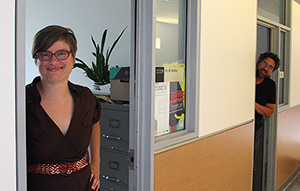The accomplishments and dedication of two leading professors in DalhousieÔÇÖs Department of Sociology and Social Anthropology have recently been recognized with their appointments as presidents to national organizations. ┬á
Martha Radice has been elected as incoming president of the Canadian Anthropology Society (CASCA), an organization devoted to promoting and supporting anthropological research across the country. Howard Ramos was recently elected as president of the Canadian Sociological Association (CSA), a professional association that promotes research, publication and teaching in sociology in Canada.
National leadership
Dr. Radice, an associate professor with DalhousieÔÇÖs Department of Sociology and Social Anthropology, is a prominent social anthropologist whose work focuses on the social, spatial and cultural dynamics of cities.
"It's great to have strong East Coast representation in Canada-wide associations,ÔÇŁ says Dr. Radice. ÔÇťRight now, CASCA has a really good spread of executive committee membership from coast to coast, representing both official languages. For me, this is a chance to give back to an organization that I have always appreciated.ÔÇŁ
Radice is excited to lead an organization whose members have been a personal source of intellectual inspiration and professional mentorship since she attended her first CASCA conference in 1999.
Dr. Ramos, professor and associate dean of research in the Faculty of Arts and Social Sciences, is an accomplished political sociologist whose research focuses on social justice and equity issues ÔÇö particularly social movements, human rights, Indigenous mobilization, environmental advocacy, ethnicity, race and Atlantic Canada. ┬á
ÔÇťHaving two members of the Department of Sociology and Social Anthropology at pilipili┬■╗ş elected as presidents of national associations shows how central the department is to Canadian social science,ÔÇŁ says Dr. Ramos. ÔÇťBeing elected as president of the CSA is a real honour and gives me a chance to give back to the association that I professionally grew up in.ÔÇŁ
An opportunity for collaboration
Lindsay DuBois, chair of DalhousieÔÇÖs Department of Sociology and Social Anthropology, shares her colleaguesÔÇÖ pride and enthusiasm.
ÔÇťBeing elected president of a national association is a tremendous sign of respect and vote of confidence from their colleagues,ÔÇŁ she says. ÔÇť┬áItÔÇÖs also great for us, since, as presidents, Drs. Ramos and Radice will gain a deeper understanding of what is happening in sociology and anthropology across Canada ÔÇö knowledge they can bring back to us. At the same time their presidencies raise DalhousieÔÇÖs profile on the national stage.┬áWe are extremely proud of our colleagues.ÔÇŁ
 Drs. Radice and Ramos, who work out of neighbouring offices, are eager to work collaboratively in their new roles.
Drs. Radice and Ramos, who work out of neighbouring offices, are eager to work collaboratively in their new roles.
"Our department is a 'joint' department ÔÇö combining sociology and social anthropology ÔÇö so it's valuable to have such close communication with both the national associations of our two disciplines," says Dr. Radice. ┬á
ÔÇťBeing in the same department, next door neighbours, and collaborators on projects makes being presidents of the CASCA and CSA at the same time really fun,ÔÇŁ says Dr. Ramos. ÔÇťIt also opens opportunities for us to work together on that front too.ÔÇŁ
Radice adds that in addition to her proximity to working with Ramos, "CASCA and the CSA already have a productive relationship. For example, the CSA has written a statement supporting our work to free Canadian anthropologist Homa Hoodfar, who has been imprisoned in Iran. Having direct contact between the organizations can help us take joint action to promote our disciplines and support our members."

